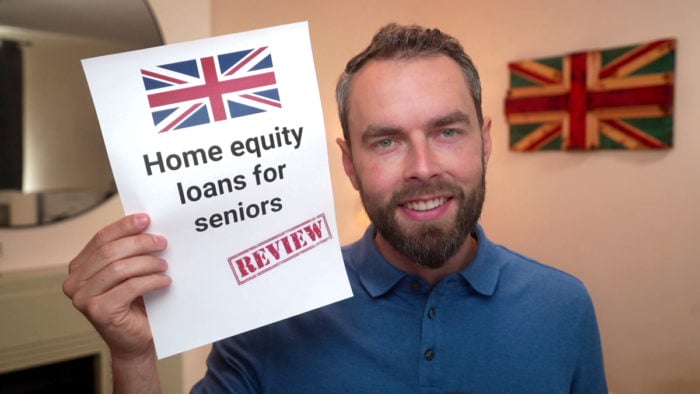Home Equity Loans for Seniors – Complete Review & Analysis
Representative example: If you borrow £34,000 over 15 years at a rate of 8.26% variable, you will pay 180 instalments of £370.70 per month and a total amount payable of £66,726.00. This includes the net loan, interest of £28,531.00, a broker fee of £3,400 and a lender fee of £795. The overall cost for comparison is 10.8% APRC variable. Typical 10.8% APRC variable

Representative example: If you borrow £34,000 over 15 years at a rate of 8.26% variable, you will pay 180 instalments of £370.70 per month and a total amount payable of £66,726.00. This includes the net loan, interest of £28,531.00, a broker fee of £3,400 and a lender fee of £795. The overall cost for comparison is 10.8% APRC variable. Typical 10.8% APRC variable
Are you interested in home equity loans for elderly homeowners? We’re here to help you uncover the true cost of a poor choice and explore other options, such as a home equity line of credit or equity release.
We understand that this topic can be confusing and may cause worry, but you’re not alone. Every month, over 6,900 people visit our website to understand more about secured loans.
In this article, we’ll cover:
- What a home equity loan is
- The cost of a bad choice
- Other options, such as a home equity line of credit
- If senior citizens can get a home equity loan
- Where to find these loans
We know the decision to take a loan can be a big one, especially when your home is involved. That’s why we’re here to provide clear, simple advice.
Let’s dive in!
What is a home equity loan?
A home equity loan is a loan that allows you to use your home equity as collateral to access a loan amount. Most lenders will offer to lend a maximum of 85% of your equity. So, if you had £50,000 equity, you may be able to get a loan worth up to £42,500.
You receive this money as a lump sum, generally with a fixed interest rate and start making repayments over an agreed repayment period anywhere between five years and 20 years. If you start missing payments then the lender can force you to sell your home to recover the money, known as foreclosure.
The lender is not likely to force you to sell up if you miss a single payment. They’re likely to work with you to come up with a mutually beneficial solution. They might lower your payments so they are more affordable, but then ask you to extend loan repayment, meaning you pay back even more than first planned. However, if it stops you from being forced to sell a property it’s worth it.
You are not guaranteed to qualify for a home equity loan just because you’ve built up equity. You may be denied the credit due to personal finances, existing debts, the repayment period needed, your credit score or other reasons.
Can a senior citizen get a home equity loan?
Yes, it is possible for senior citizens and retirees to get a home equity loan or HELOC, depending on their personal circumstances, finances and the lender.
Although they may not have employment income to pay back the loan, they could have multiple pensions, investments and other income that ensures they can afford the loan. Affordability will be assessed on a case-by-case basis.
Lender |
APRC |
Monthly payment |
Total amount repayable |
|---|---|---|---|
| United Trust Bank Ltd | 5.99% |
£218.73 |
£26,247.92 |
| Pepper Money | 6.86% |
£220.24 |
£26,429.17 |
| Together | 6.95% |
£220.40 |
£26,447.92 |
| Selina | 7.5% |
£221.35 |
£26,562.50 |
| Equifinance | 7.7% |
£221.70 |
£26,604.17 |
| Spring | 10.5% |
£226.56 |
£27,187.50 |
| Loan Logics | 11.2% |
£227.78 |
£27,333.33 |
| Evolution | 11.28% |
£227.92 |
£27,350.00 |
Representative example: If you borrow £34,000 over 15 years at a rate of 8.26% variable, you will pay 180 instalments of £370.70 per month and a total amount payable of £66,726.00. This includes the net loan, interest of £28,531.00, a broker fee of £3,400 and a lender fee of £795. The overall cost for comparison is 10.8% APRC variable. Typical 10.8% APRC variable.
Search powered by our partners at LoansWarehouse.
Where to find home equity loans for seniors
There are no specific home equity loans for people who are seniors that cannot be used by those who are not seniors (except some equity release options discussed a little later!).
Seniors can apply for home equity loans the same way other people can, and they can find them through the same types of lenders. UK high-street banks offer these types of loans, but HELOCs appear to be more widely available at the time of writing.
Along with banks and some building societies, online lenders also offer loans and equity release products. Always do your research about the lender you are considering applying to, and only use one that is recognised by the Financial Conduct Authority.
» TAKE ACTION NOW: Compare deals from the UK’s leading lenders
Is there an age limit for a home equity loan?
Home equity loans are generally only available to people over 18 years old. However, if you are trying to use a home equity loan in later life, there may be a more advantageous way to release equity, such as a reverse mortgage.
You may want to speak with free money advice services or commercial financial services to get help and support understanding your options.
Home equity loans for all purposes
- Stuck paying high interest on credit card debts & loans?
- Looking to fund a home improvement project?
- Dreaming of finally taking the once-in-a-lifetime trip?

Polly
“This was by far possibly one of the nicest experiences I’ve had getting a secured loan.”
Reviews shown are for Loans Warehouse. Search powered by Loans Warehouse.
Equity release for seniors
We have provided details on some of the most popular methods of accessing equity for seniors. Consider all options and seek personalised professional advice before making a decision.
- Reverse Mortgages
What is a reverse mortgage?
A reverse mortgage is a type of equity loan for seniors that allows the homeowner – or homeowners – to access some of the home equity without ever needing to make repayments. The equity can be paid out as a lump sum or over a drawdown period as and when the money is needed, even monthly. The latter options may be useful if the homeowners want to increase their retirement income.
The loan amount is subject to interest but the capital and the interest are only paid back to the lender when the homeowner dies. If there are two homeowners, then the loan and interest is only repaid upon the death of the surviving homeowner. If the homeowners sell the property, possibly to go into an aged care facility, then the loan will need to be repaid.
The property is used as a security for the loan, and if there is not enough money in the estate to repay, the property may be sold to pay back the lender. Beneficiaries of the estate may be able to pay off the lender and keep the property if desired, and the homeowners themselves may be able to make voluntary interest payments while still alive.
Are reverse mortgages for seniors?
Yes, these types of equity release products are aimed at senior citizens. Most lenders will require the homeowner(s) to be at least 55 years old to offer this type of mortgage with some minor exceptions.
Due to the age requirements of a reverse mortgage, people using them typically do it to help fund their retirement, buy a big-ticket item or go on a long-term holiday. They may choose to do it to help family members with their own finances, such as supporting them to get on the property ladder.
Do I qualify for a reverse mortgage?
To qualify for a reverse mortgage, you will need to be at least 55 years old in the majority of cases. If a married couple is considering this option, then the younger of the pair will need to be at least 55 years old.
There are further criteria to be eligible. Most lenders will only consider enabling equity release if the homeowners do not have any existing lien of credit on the property, such as a mortgage. In a nutshell, you’ll need to own your home outright.
Furthermore, both applicants must be UK residents for tax purposes, which generally means living in their UK residence for at least six months of every tax year.
Are there age limits on a reverse mortgage?
Most lenders do not apply maximum age limits when offering reverse mortgages. Some lenders may cap these mortgages to people between 85 and 95 years old, but this is not the norm. Lenders are more interested in ensuring the homeowner is of sound mind when making the decision and they are fully aware of the financial agreement they are making.
The pros and cons of a reverse mortgage
The benefits of using these mortgages are:
- Access large credit
- Make retirement more comfortable
- Fund once-in-a-lifetime experiences
- Potential to help family
- No payments to make
- Not subject to income tax (it’s a loan – not income!)
- Using legitimate lenders prevents any chance of eviction
The cons of using these mortgages are:
- You are essentially selling your home but allowed to keep living in it
- It prevents you from leaving the home to beneficiaries in your will
- You may need to pay other fees, including fees to professional guidance
What is the difference between a reverse mortgage and a lifetime mortgage?
There are no differences between a reverse mortgage and a lifetime mortgage. People in the UK typically call them a lifetime mortgage, whereas other Anglo-speaking countries (the USA, Canada, Australia etc.) call them reverse mortgages.
2. Retirement Interest-Only Mortgages
What is a retirement interest-only mortgage?
A retirement interest-only mortgage, also known as an RIO mortgage, is another option for seniors wanting to access home equity. It is a mortgage that can be used to access equity as a lump sum, but the homeowner only has to make monthly interest payments rather than pay the full loan balance back.
The applicant will still need to prove they can make the monthly interest payment, based on any sources of income.
How does a retirement interest-only mortgage work?
The RIO mortgage works by providing the homeowner with funds based on their available home equity and affordability checks. The homeowner will then make an interest payment until they die. There is no fixed repayment period within this type of mortgage. The capital of the mortgage is then repaid after death from the homeowner’s estate, which may force the sale of the property.
To be eligible for an RIO mortgage, you’ll need to be at least 55 years old. If applying with a spouse, the youngest of the homeowners will need to be aged at least 55.
The pros and cons of a retirement interest-only mortgage
The benefits of choosing an RIO mortgage are:
- The interest rates on these mortgages are typically lower than the interest on lifetime mortgages.
- There are options to repay the mortgage early, but charges may apply!
- Option to move home and downsize with this mortgage
The disadvantages of an RIO mortgage are:
- You need to have no existing mortgages (also the case with reverse mortgages)
- You still have to pay interest, usually on a monthly basis
- Interest could change and has no end-date
- Your home will be sold when you die, reducing the amount of inheritance you pass on
Alternative credit options for seniors
Seniors don’t always have to utilise their home equity to access credit. Alternative options include but are not limited to:
- Unsecured personal loans
- Secured personal loans
- Credit card
- Refinancing mortgage
- Unlocking a pension
- Debt consolidation loans (if it fits the purpose)


